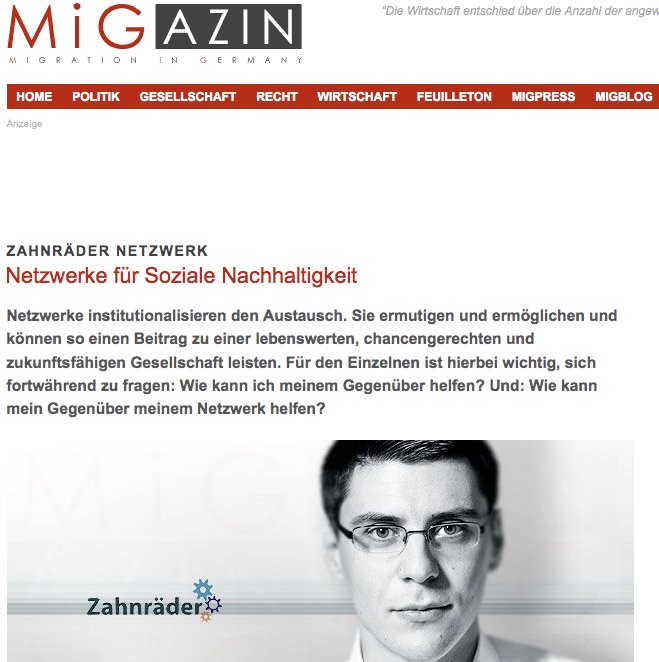I have just published an article on migazin.de about networks and social sustainability. Networks are described as institutionalized platforms which encourage and enable exchange, interaction and all kinds of transfer. These networks can help us striving for social sustainability.
// An “uncle doctor substitute support system”
The socio-economic or ethnic background should not matter in a meritocratic society. But it does. There simply is a huge discrepancy between what is and what should. This is not socially sustainable. Social sustainability is one of the three pillars of sustainability – next to economic and environmental sustainability. It is all about people, planet and profit – though I don’t think profit captures it. But value does not start with a “p”, does it? But let us focus on people in this blogpost.
Networks have to substitute the missing uncle doctor. People from lower social or educational classes simply have a lower density and access to uncle doctors. Uncle doctor (or aunt doctor) hereby stand for a wise person, who can provide advice and help in all kinds of areas. Networks can act as an “uncle doctor substitute support system”.
// Us & between us
We essentially have us and what is between us: We could call us actors or agents and the between us a system or structure. Or in terms of network theory we have nods, connections and relations. Nodes are stations, connections are rails and the relations are trains travelling on rails between certain stations. We are nods connected to each other with certain kinds of relations.
These networks could and should strive for social sustainability. They key is to allow for changemakers and allow changemakers making change happen. Simplified we have two ingredients. Ingredient one: the person, actor, agent or nod: this entity needs to ask himself two questions: How can I help you? And: how can you help my network? Ingredient two: the system, structure or connections and relations. These need to encourage and enable interaction and exchange. Both together create a willingness and an ability to change.
// How to fish?
How does this look practically? As often: it depends. There are many ways to facilitate this. The goal is the creation of ability on the one hand and the usability on the other hand. The Zahnräder Network attempts to encourage as well as enable efficient and effective interaction by equiping its participants with knowledge to fish rather than the fish itself. And it provides a place – on- and offline – for structured interaction. More on Zahnräder in my blogpost for August.
// Shaping society
Ability and usability can be paired and focused on participating in and for a pluralistic and socially sustainable society. Networks can substitute the uncle doctor and contribute to social sustainability. In this society, no one must have the response – but everyone should feel responsable.

Pingback: Social Incubator for Social Entrepreneurship «
Pingback: Zahnräder Network «
Pingback: Zahnräder Network «